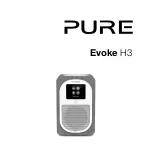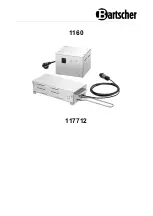
If the ceiling contains insulation, remove the
insulation at the cutout and approximately 1 foot
around it. This ensures adequate air volume for
the C-8C/C-6C to operate. Secure any loose
insulation that may fall on the speaker.
If the ceiling is not insulated, it is recommended
that the cavity is stuffed with approximately 2
feet of fiberglass insulation around the cutout,
starting at about 1 foot around the cutout. The
insulation will provide damping to the speaker
and isolate vibrations.
Speaker Wire
In ceiling speakers should be connected to the
amplifier with UL rated CL2/CL3 speaker wire –
this is required by building code for most
consumers. Avoid installing speaker wire in
parallel with household AC wiring to avoid
potential hum. It is okay for speaker wire to
cross AC wiring at a right angle, however.
It is recommended that a professional or
licensed electrician perform the speaker wire
installation if you are uncomfortable with the task.
The gauge or thickness of the speaker wire can
affect the performance of the C-8C/C-6C.
Always choose a CL2/CL3 rated in-wall speaker
wire of the appropriate gauge to prevent
excessive speaker wire resistance. Using
undersized speaker wire can result in lose of
volume, detail, and dynamic range. Please
select speaker wire for the C-8C/C-6C based on
the following minimum recommendations:
50' or less - 16 Gauge 2 Conductor CL2/CL3
50' - 80' - 14 Gauge 2 Conductor CL2/CL3
80'-120' - 12 Gauge 2 Conductor CL2/CL3
120'-200' - 10 Gauge 2 Conductor CL2/CL3
Amplifier speaker output terminals are typically
color coded with black for negative (-) and red
for positive (+). Similarly, the C-8C/C-6C has
speaker wire terminals with a black and red
color coding. When connecting speaker wire,
ensure that the positive terminal on the amplifier
is connected to the positive terminal on the C-
8C/C-6C. And similarly, the negative terminal on
the amplifier should be connected to the
negative terminal on the C-8C/C-6C. Speaker
wires typically use at least one of several
possible methods to help maintain correct
polarity, including color coded insulation or
conductor strands, or printing of text and
symbols along one side of the wire insulation.
Removing the Grill
The C-8C/C-6C has 4 mounting tabs on the
back that rotate. While looking at the back of the
speaker, rotate the tabs fully counter clockwise
so that they stick out away from the speaker
frame. Slide each tab towards the front of the
speaker and when the tab screw comes in
contact with the grill, push gently so that the grill
comes away from the speaker.
The grill is held in place by contact pressure.
Take care when removing and reinstalling the
grill to not distort it due to excessive force.
Mounting the Speaker
While looking at the back of the C-8C/C-6C,
rotate the tabs fully clockwise so that they are
inside the speaker frame (See Figure 2). If a tab
does not stay rotated, tighten its screw until it
stays rotated – do not over tighten.
Figure 2
Place the speaker into the ceiling cutout. One at
a time, loosen each of the four screws until the
tabs can turn freely. Next tighten each screw
clockwise until the tabs press firmly against the
inner surface. The speaker need only be
properly aligned and held securely to the ceiling
– do not over tighten to break the tabs or
damage the drywall.






















